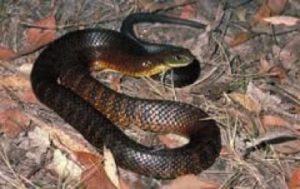NATURE IN THESE PARTS
Monday September 1, 2014The once-famous old movie comic, W.C. Fields, part of whose act was tippling, used to say that he liked to keep a stimulant handy in case he met a snake. He added he also liked to keep a snake handy.
Yesterday afternoon I was out walking on a sandy track in the bush near my hometown in the Blue Mountains of Australia. The ground here is strewn with dark twigs and branchlets of various sizes and its dust has a pink tinge. I easily could have been looking upwards for birds, but happened to look down… and realised that a particularly long bit of wood in front of me was a snake. Not moving. I was only a couple of steps from it at most, and would have walked right on top of it if I hadn’t looked down. It was getting toward one and a half metres long, with a low-contrast banding on it. It didn’t react to me, and I went absolutely still. Then I made very quiet, gentle backwards steps to end up I suppose five or so metres away. Then the snake’s head darted a bit, and slowly it turned around and slid off into long grass beside the track.
It had a strange beauty. The banding of smoky light brown and then smoky reddish bluish was subtle. When you sight a creature like this, it’s almost as if you intuit the origins of the Indigenous art palette. I made mental notes on its appearance and have now looked it up.
It was an adult Tiger, the fourth-deadliest snake in the entire world. One of its noted characteristics, it turns out, is that it doesn’t react to humans approaching it until they’re within a metre. Then you’re dead.
The picture here corresponds the closest in coloration to the one I met, a perfect adaptation to its surroundings.

When I told friends, they responded not just with Oh-No’s but with a flood of poems. Who said that literature was no longer relevant to life? They cited Emily Dickinson’s A Narrow Fellow In The Grass, D.H. Lawrence’s Snake, Judith Wright’s The Killer.
But the most apt and memorable was something from the second book of the great Latin poet Virgil’s Aeneid, dealing with the Trojan war. The Greek warrior Androgeos meets a band of Trojan warriors disguised in Greek armour. Thinking he’s with allies, Androgeos calls to them, then suddenly realises he has come upon the enemy. Virgil’s terrifying word-image here, beginning obstipuit retroque pedem cum voce repressit, is translated by the esteemed Latinist who sent it to me:
Androgeos is stunned. His footstep and his voice are paralysed,
just as one who, amid the rough undergrowth,
suddenly treads upon a snake lying on the ground.
Frightened and struggling to get away, he flees from
the creature, all swollen and rearing up
its grey-blue neck and its wrath. Not otherwise
did Androgeos, terrified by the sight, run away.
For myself, if I’d known that this attractive serpent in front of me was a tiger, my initial gentle backwards steps would have fast got me the whole two kilometres to the local railway station, in full Androgean style.